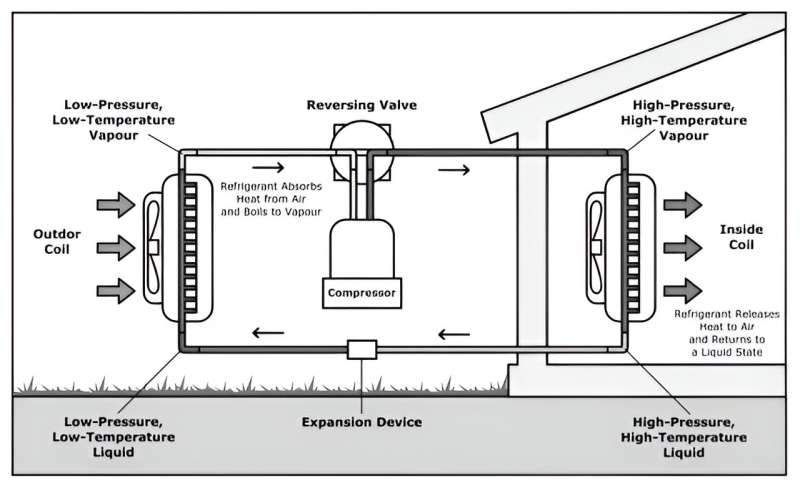This article has been reviewed according to Science X's editorial process and policies. Editors have highlighted the following attributes while ensuring the content's credibility:
fact-checked
trusted source
proofread
The challenges hindering the adoption of heat pumps in the UK

A new report, led by UofG housing experts, exposes the intricate challenges hindering the adoption of heat pumps in the U.K. Only 55,000 installations are occurring yearly as of mid-2023, considerably behind the U.K. government's annual target of 600,000.
The report, by the UK Collaborative Center for Housing Evidence (CaCHE), dissects the complexities contributing to the disparity between government targets and installations before presenting a range of systemic solutions for a more sustainable transition.
Heat pumps are a cornerstone of the government's decarbonization agenda in the U.K. The electrification of domestic heating, underwritten by the installation of ground, air and water-source heat pumps is expected to reduce the U.K.'s greenhouse gas emissions by about 15%–17%.
Author Dr. Nicholas Harrington of CaCHE emphasized the urgency of addressing the critical issues outlined in the study. "This report reveals the nuanced web of challenges affecting the widespread adoption of heat pumps in the U.K. By understanding the feedback loops and barriers identified, we can tailor effective policy interventions. Crucially, the relative pricing of electricity to gas emerges as a pivotal factor. If we can address this dynamic, we open the door to a more seamless and cost-effective transition to sustainable heating solutions."
In the report, Dr. Harrington identifies four critical feedback loops that can frustrate heat pump adoption.
- Regulatory framework challenges: Existing regulations impact the quality of the UK's housing stock; fabric issues necessitate pre-installation fabric upgrades in some cases, to avoid increased running costs; and the price of electricity relative to gas complicates regulatory opportunities, especially in fuel poverty contexts.
- New build/developer paradox: Limited heat pump installers affect developer confidence in large-scale HP rollout; developer schemes influence heat pump demand, sector growth, and installer supply.
- Boiler upgrade scheme (bus) limitations: The BUS grant is insufficient if additional fabric and system upgrades are required; many owners are unaware of the pre-application of necessary additional upgrades; lack of coverage deters owners who require additional upgrades; and low BUS grant uptake sends mixed signals back to policy maker.
- Electricity vs. gas dilemma: Consumer decisions are influenced by electricity and gas price differentials; shifting levies onto gas may worsen social tenant fuel poverty; and concerns over fuel poverty limit policymaker options.
More information: Report: housingevidence.ac.uk/publicat … arriers-to-adoption/
















